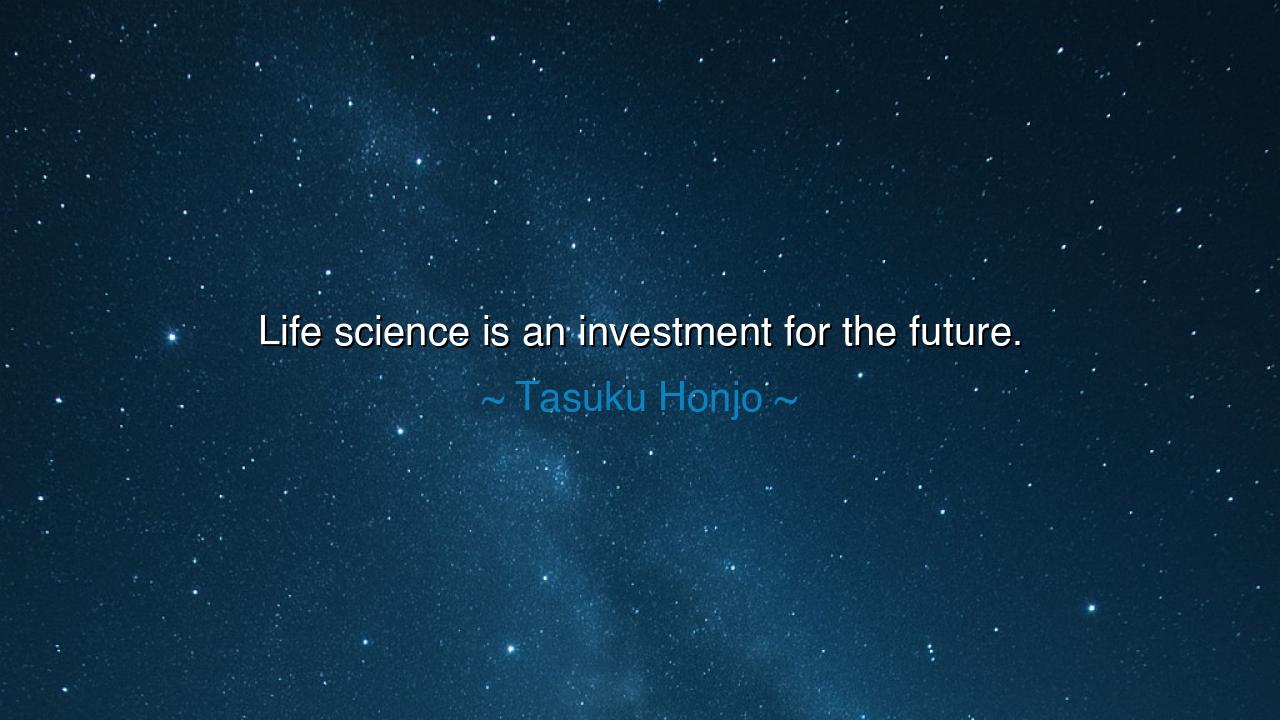
Life science is an investment for the future.






In the tapestry of time, the greatest achievements often come not from seeking immediate reward, but from planting seeds that will grow into a legacy for future generations. Tasuku Honjo’s words, “Life science is an investment for the future,” reflect a timeless truth: that the knowledge we cultivate today, especially in the realm of life science, will shape not only our world but the world of those who follow us. The research and discoveries we make in health, biology, and medicine today may not yield fruit for many years, but they form the foundation for advances that will sustain and enrich life in the ages to come. Life science is not just an intellectual pursuit; it is a sacred responsibility to ensure that humanity’s future is not just about surviving, but thriving.
In the ancient world, the idea of investing in the future was not foreign. The great philosophers and scholars of Greece and Rome understood that the pursuit of knowledge was not merely for the present moment, but for the enlightenment of generations to come. Consider Plato’s Academy or Aristotle’s Lyceum—institutions dedicated not only to their own time, but to the progress of humanity. Their work was an investment in the minds of future thinkers, leaders, and scholars. They were not concerned only with immediate benefit, but with the knowledge that would shape the world for centuries. Similarly, life science today serves as an investment that will yield benefits for the generations to come, guiding us toward healthier, longer, and more fulfilling lives.
Hippocrates, the father of modern medicine, was the first to recognize the interconnection between the individual and the world. He understood that health was not just an individual pursuit but a communal responsibility, and that what we know and practice today must be shared and built upon by those who come after us. The knowledge passed down through his teachings has shaped the field of medicine for over two millennia. Just as Hippocrates laid the groundwork for modern health with his principles and writings, so too are scientists today building the foundations for future medical breakthroughs. Honjo’s reflection reminds us that life science is not simply about today’s cures or innovations, but about creating a future where the potential of humanity is maximized and its challenges overcome.
Consider the development of vaccines over the centuries. The work of Edward Jenner in the late 18th century, when he discovered that exposure to cowpox could prevent smallpox, was a revolutionary investment in public health. At the time, Jenner could not have foreseen that his discovery would lead to the global eradication of smallpox, but his pioneering research laid the foundation for a future where diseases that once killed millions could be controlled and eliminated. In this way, life science is not merely about solving problems of the present, but about creating the potential for future solutions that will affect generations to come. Honjo’s words remind us that each discovery, each investment in knowledge, has the potential to change the course of history, shaping a better future for all.
The lesson of Honjo’s quote is clear: investing in life science is an act of vision, an effort to look beyond the present and into the future. As we push the boundaries of knowledge in medicine, genetics, and health, we are not just solving the problems of today but preparing to face the challenges of the future. Each new discovery, whether it is in cancer research, genomic editing, or neuroscience, is an investment in a future where disease, suffering, and early death may be diminished. The pursuit of knowledge in life science is, therefore, not a short-sighted endeavor, but a long-term mission that benefits all of humanity.
In our own lives, we must approach our work with a similar mindset: what we do today can create a future of abundance for those who come after us. Whether in medicine, technology, education, or any other field, we must consider the legacy of our actions and how they can contribute to the greater good of humanity. We are the torchbearers of knowledge, and our responsibility is to pass the light forward, ensuring that the generations that follow us have the tools and wisdom to overcome the challenges of their time.
Thus, as we go forward in our own lives, let us remember that the seeds of progress we plant today will flourish tomorrow. Whether in research, innovation, or learning, every action we take is an investment in a future that will benefit not only ourselves, but the world we leave behind. Just as Hippocrates, Jenner, and countless others invested in the future through their discoveries, we too have the power to shape the course of history by embracing the sacred duty of knowledge and progress.






AAdministratorAdministrator
Welcome, honored guests. Please leave a comment, we will respond soon